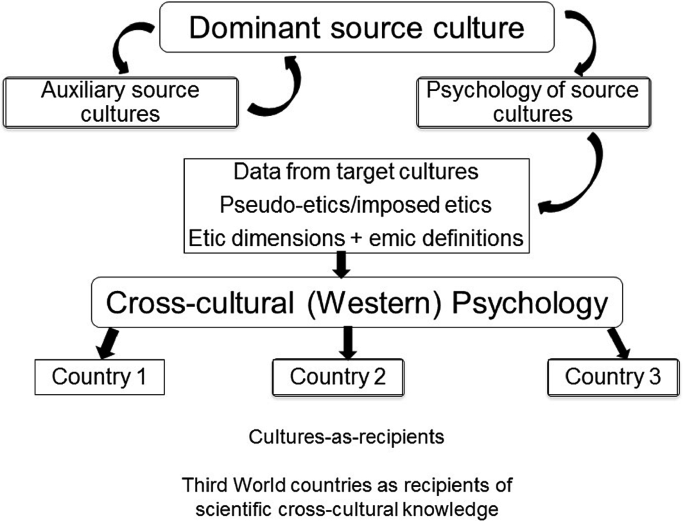Introduction
Social psychology, as it emerged in the West, has often been criticized for its limited applicability across cultures. Most theories, methods, and constructs have been developed in the United States and Europe, creating a psychological science that may not resonate with non-Western societies. Indigenization is a movement aimed at re-rooting psychology within local cultural contexts. It emphasizes developing theories, concepts, and methods that are meaningful and relevant to indigenous populations.
Read More- Social Psychology
What is Indigenization?
Indigenization refers to the process of adapting and developing psychological concepts and methods in a way that aligns with the cultural, social, and historical contexts of a particular society. According to Sinha (1997), indigenization can be of two types:
- Indigenization from Out: Importing Western theories and adapting them to local conditions.
- Indigenization from Within: Developing theories based on local knowledge systems, languages, and philosophies.
Both approaches aim to bridge the gap between universal psychological principles and culturally specific realities.

Process of Indigenization
Rationale for Indigenization
Cultural Relevance
Western psychological constructs like individualism, self-esteem, and autonomy may not capture the lived experiences of people in collectivist societies. Indigenization ensures that psychological research reflects local values and beliefs.
Epistemological Diversity
Different cultures have unique ways of knowing and understanding the world. Indigenous knowledge systems often emphasize relationality, spirituality, and community over individuality and materialism.
Social Justice
Indigenization promotes epistemic justice by challenging the dominance of Western paradigms and empowering marginalized voices.
Practical Effectiveness
Culturally adapted interventions in mental health, education, and community development are more likely to be effective and sustainable.
Historical Context
Some important context can be found in-
- Latin America- Ignacio Martín-Baró, a Jesuit priest and psychologist, pioneered liberation psychology in El Salvador. He emphasized the role of psychology in addressing social injustice and political oppression.
- Africa- The concept of Ubuntu (“I am because we are”) has been central to African psychology. Scholars like Nsamenang (1992) have developed models based on African child development and socialization.
- India- Psychologists like Durganand Sinha and Girishwar Misra have been instrumental in promoting indigenous psychology. Concepts such as Dharma (duty), Karma (action), and Seva (service) are central to Indian thought.
- East Asia- In countries like China and Japan, Confucianism, Taoism, and Buddhism influence psychological understanding. The concept of interdependent self (Markus & Kitayama, 1991) contrasts with the Western notion of an independent self.
Features of Indigenous Social Psychology
- Cultural Grounding- Research is based on local languages, symbols, and practices. For example, the concept of “Amae” in Japanese psychology refers to a sense of indulgent dependency.
- Community Participation- Participatory Action Research (PAR) involves community members as co-researchers, ensuring that the research addresses real-life problems.
- Narrative and Qualitative Methods- Oral histories, storytelling, and ethnography are used to capture the richness of human experience.
- Ethical Sensitivity- Indigenous research respects local customs, rituals, and power dynamics. Researchers seek informed consent in culturally appropriate ways.
Methodological Approaches
Mixed Methods
Combining qualitative and quantitative approaches allows for a more holistic understanding. For instance, surveys can be complemented with focus group discussions.
Culturally Valid Measures
Researchers develop or adapt instruments that reflect local realities. For example, the Indian Family Values Scale measures collectivism, respect for elders, and spiritual beliefs.
Case Studies and Ethnography
In-depth case studies provide insights into unique cultural phenomena. Ethnographic research involves immersion in the community.
Challenges
Some challanges include-
1. Marginalization
Indigenous research is often sidelined in mainstream academic discourse. Journals may prefer conventional methodologies.
2. Lack of Resources
Funding, training, and institutional support for indigenous research are limited.
3. Integration with Global Psychology
Striking a balance between local relevance and global applicability remains a challenge.
4. Language Barriers
Translating psychological concepts without losing their essence requires linguistic and cultural expertise.
Conclusion
Indigenization is not just a methodological adjustment but a paradigm shift. It challenges the dominance of Western psychology and calls for a more inclusive, diverse, and equitable discipline. By grounding psychological research in local realities, indigenization enriches our understanding of human behavior and fosters social justice. As we move toward a global psychology, the contributions of indigenous perspectives will be indispensable.
References
Markus, H. R., & Kitayama, S. (1991). Culture and the self: Implications for cognition, emotion, and motivation. Psychological Review, 98(2), 224-253.
Martín-Baró, I. (1994). Writings for a Liberation Psychology. Harvard University Press.
Misra, G., & Gergen, K. J. (1993). On the place of culture in psychological science. International Journal of Psychology, 28(2), 225-243.
Nsamenang, A. B. (1992). Human Development in Cultural Context: A Third World Perspective. Sage.
Sinha, D. (1997). Indigenizing psychology. In J. W. Berry, Y. H. Poortinga, & J. Pandey (Eds.), Handbook of Cross-Cultural Psychology (Vol. 1, pp. 129-169). Allyn & Bacon.
Niwlikar, B. A. (2025, July 17). Indigenization of Social Psychology and 2 Important Types of It. Careershodh. https://www.careershodh.com/indigenization-of-social-psychology/
